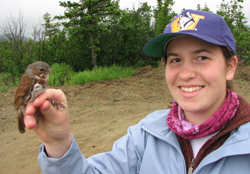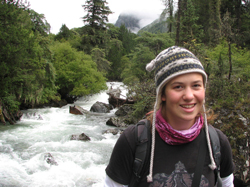|
On Carolyn Bauer’s first day of college her Freshman Interest Group (FIG) met with Biology professor Carl Bergstrom who expressed to them the importance of getting involved with research as undergraduates. Carolyn took that message to heart and subsequently searched the list of Biology faculty when toward the bottom of the alphabetical list she came to John Wingfield’s name. John works on birds and Carolyn had always loved birds, so she emailed him to inquire whether he needed any help in the lab.
Shortly thereafter Carolyn started working with John’s post-doc Jason Davis, who was investigating the effect of corticosterone, an important stress hormone in birds, on white-crowned sparrow cognition. The data from his studies indicate that white-crowned sparrows with chronic elevated levels of corticosterone in their system perform better on tests measuring learning and memory than birds with baseline levels of the hormone in their system. Based on the results gathered from Jason’s experiments and using funds awarded to her in a Mary Gates Undergraduate Research Scholarship, Carolyn designed an independent spin-off experiment to test whether acute elevated levels of corticosterone in the system would have similar effects as chronic elevated levels. Data from her studies suggest that, in fact, acute levels do not have the same effect as chronic elevated levels. Rather on the contrary, birds with acute elevated levels of the hormone have an impaired learning ability compared to birds with baseline corticosterone levels in their system.
Last fall the Department of Biology granted Carolyn a Casey Award to travel to the national meeting of the Society for Integrative and Comparative Biology in January in San Antonio, Texas where she presented a poster on her white-crowned sparrow research. It was the first time she presented her own research at a meeting and received feedback from other scholars in the field.
After completing her independent research project, Carolyn went to Alaska last summer to do field work with Doug Wacker, one of John’s former graduate students. There she helped Doug catch Northern red fox sparrows for a subspecies comparison on aggressiveness. By simulating territorial intrusions (STIs), aggression can be measured relatively easily by monitoring a bird’s response behavior. In addition to providing behavioral data, STIs also involve taking blood samples to measure testosterone levels so that correlations between testosterone levels and aggressive behavior can be determined.
|
Later in the summer Carolyn went to China on an exploration seminar led by post-doctoral researcher Michael Dillon, former graduate student Melanie Frazier (featured in the Fall 2007 Newsletter), and Melanie’s husband. The course was four weeks long and attended by 20 students. Students worked in teams on a research project they designed. Carolyn and her partner looked at flower morphology of predominant species across an elevation gradient. While she really enjoyed the research side of the trip, the highlight, she says, was visiting the Wolong Panda Reserve and playing with the baby pandas.
John Wingfield moved to UC Davis last summer, so Carolyn is now working in a different lab on an entirely different system. Working with Biology graduate student David Haak, Carolyn has started investigating how drought affects chili pepper pungency. Most of her research time will now be spent in the Department of Biology’s Greenhouse, where she will gain extraordinary experience by switching from studying an animal system to a plant system, a somewhat uncommon practice among researchers at any level.
With a little over a year to go in school, Carolyn is already planning on studying bird environmental endocrinology in graduate school. But beyond that she doesn’t like to think too far ahead. Nevertheless, one thing’s for sure: her love for birds is likely to shape her future just as it has so much of her undergraduate career.




